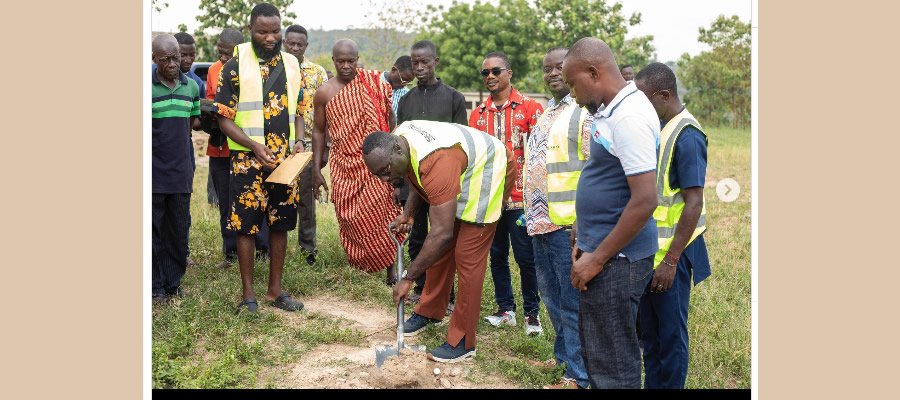

IMPLEMENTATION DESIGN, PHASING AND PRESENTATION IN
LOGICAL FRAMEWORK
Introduction
This chapter deals with the implementation design and phasing of the plan and the presentation of the plan in a logical framework. Key stakeholders and their roles and responsibilities in the plan implementation have also been dealt with in this chapter.
Key Stakeholders - Roles and Responsibilities
The Water and Sanitation Plan implementation process will involve a number of stakeholders, each with different and complementary role to plan. Table 5.1 shows the various stakeholders, their roles and responsibilities in the plan implementation.
Terms of Reference for Procurement of Contractors
Contracts shall be procured in accordance with the provisions in the procurement Act 2003, (Act 663). The terms of reference shall be in relation to the project type and threshold as spelt out in the Act. With the selection of Contractors/Consultants, the District Assembly will use the National Competitive Tendering method. Also the least Cost Selection method where the lowest responsive evaluated bidder will be selected. The terms of reference for the selection shall be as follows:
- The contractor should register with the Assembly.
- An advertisement on the project/activity shall be put in the news papers in Ghana. Preferably the Daily Graphic and the Daily Guide.
- Bids would be sold, received and opened on fixed dates in the presence of contractors or their representatives at a District Tender Committee meeting.
- Bids will be evaluated and evaluation report would be submitted to the District Tender Committee for approval and further action.
- Selected contractors would be notified through letters of acceptance and dates would be fixed for site possession after the necessary agreements have been entered into and an acceptable schedule of activities have been submitted by the contractor(s).
Contract Award and Management Including Supervision
Contract award and management of projects will be based strictly on the provision of the procurement Act 2003, Act 663. The award of contracts would be as follows:
- Evaluate bids to select the lowest evaluated bidder.
- Approval by District Tender Committee of evaluation report.
- Prepare and send acceptance letters to selected bidders.
- Receive response from selected bidders.
- Signing agreement with contractors in the presence of community leaders.
- Submission of programme schedule/chart by contractors to District Tender Committee.
- Site possession.
- Commencement of projects execution.
- Inform non-selected bidders why they were rejected.
Measures to be used to effectively supervise contracts awarded include;
- Engage the services of consultants.
- Arrange and implement post-contract procedures.
- Engage in effective communication with contractors through consultants.
- Keep programme and progress charts.
- Organise regular site meetings and keep records and minutes of site meetings.
- Ensure quality control of projects.
- Deploy DWST to do constant supervision of projects at sites.
- Carry out interim valuation and issue of certificates.
- Take over projects completed technically and set the defective liability period.
- Prepare final certificates upon substantial completion of work.
Training Needs for Stakeholders
The operation and maintenance guidelines state that;
- The Community shall own and manage the facility.
- The Community pays through levies or pay as you fetch, or through other method(s) they deem suitable and sustainable.
- The Community does the repairs of the facility by engaging recognized artisans/mechanic.
- Spare parts should be obtained from a recognized dealer.
- WATSANS and Artisans (mechanics) are to be trained. The training shall be delivered by the District Assembly.
- The District Assembly shall facilitate, monitor and co-ordinate the operation and maintenance of the facilities.
- Communities would be organized through community meetings, sensitization, animation, training and formation of WATSANS/ WSDBs.
For effective utilization of these guidelines, there is the need for all stakeholders to undergo some training in order to build their capacities and to meet the challenges in water and sanitation service delivery. Table 5.2 indicates the stakeholders and their respective training needs.
The Logical Framework of the District Water and Sanitation Plan
The logical framework is the management tool that is meant to facilitate the effective implementation and monitoring of the various projects/programmes outlined in the DWSP. It clearly states the overall goal and objectives to be achieved, outputs to be produced as well as the various activities to be undertaken during the implementation process. It also looks at the relevant indicators that can be used as yardstick for measuring performance, the means or source of data for verification and the necessary conditions that can provide the bases for important assumptions. The detail of this is provided in table 5.3 below
Date Created : 11/28/2017 4:08:01 AM











 facebook
facebook
 X
X
 Youtube
Youtube
 instagram
instagram
 +233 593 831 280
+233 593 831 280 0800 430 430
0800 430 430 GPS: GE-231-4383
GPS: GE-231-4383 info@ghanadistricts.com
info@ghanadistricts.com Box GP1044, Accra, Ghana
Box GP1044, Accra, Ghana